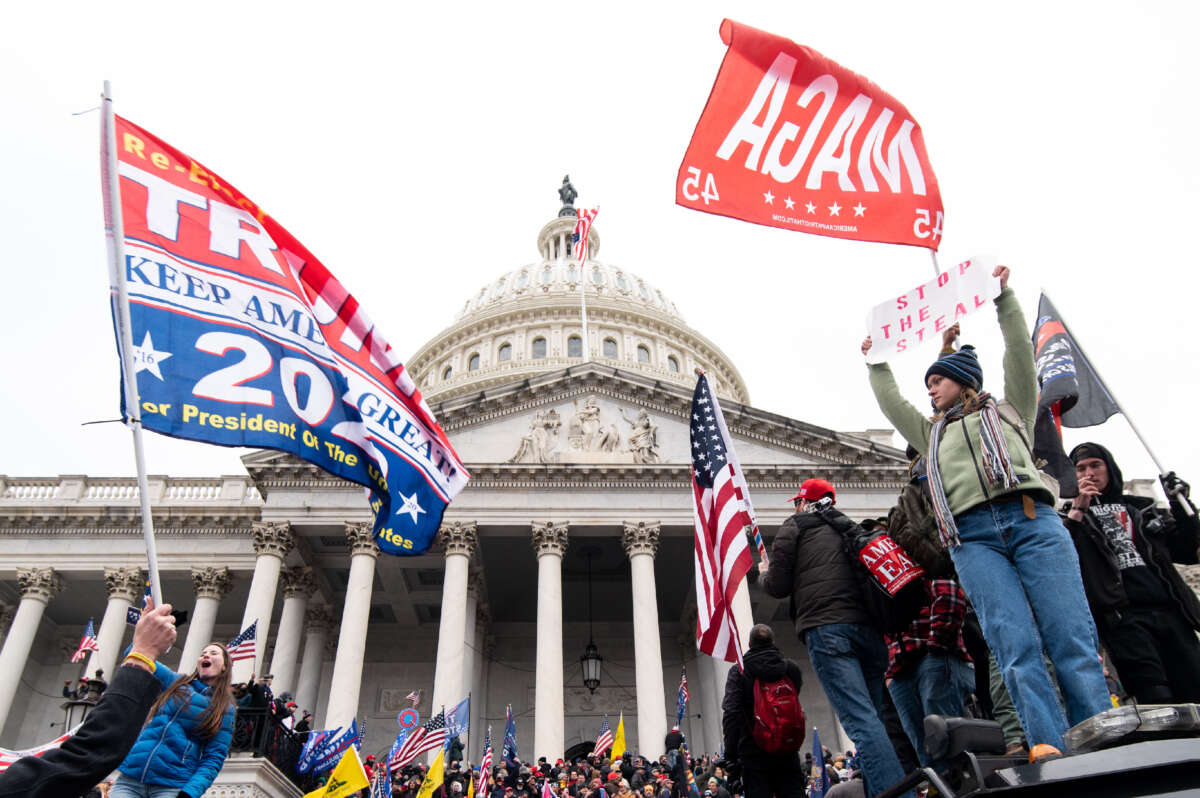The United States Supreme Court has agreed to hear an appeal from a Trump loyalist who took part in the attack on the U.S. Capitol building on January 6, 2021, setting up the possibility that his case will result in delays for former President Donald Trump’s own trial, which is supposed to begin in March.
The Court’s decision to hear the appeal — from a man named Joseph W. Fischer, who took part in the Capitol attack and was convicted of seven charges related to it — was unsigned, meaning that none of the justices who agreed to hear the case indicated publicly that they did so. At least four justices of the Court must agree to hear a case in order for it to proceed.
Among his convictions, Fischer was charged with obstruction of an official government proceeding under 18 USC 1512(c)(2)). That statute reads as follows:
Whoever corruptly…obstructs, influences, or impedes any official proceeding, or attempts to do so, shall be fined under this title or imprisoned not more than 20 years, or both.
Fischer’s appeal, however, rests on the idea that the law requires an illegal action to include an object of some kind — a document or a record, for example — to be considered obstruction. Fischer’s lawyers allege that the law, which was passed in 2002 in response to the Enron scandal, is also being unduly applied to him because it was intended to deal with white collar crimes.
It will take a few months before the Court hears oral arguments in the case, and could take until June for them to issue an official opinion.
Among the four charges Trump faces in his own election subversion case, brought forth by special counsel Jack Smith, is the same statute that Fischer is challenging. Trump is being charged by that statute due to the fact that he commanded a mob of his loyalists on the morning of January 6, 2021 — of which Fischer was one — to go directly to the Capitol itself, while it was in session certifying the 2020 presidential election results, which Trump lost to President Joe Biden. Trump’s direction, and the rhetoric he used that morning, is alleged to have directly led to the attack, and his refusal to try to diffuse the situation for hours afterward is also being examined in the case.
Trump’s lawyers will likely use Fischer’s case before the Supreme Court to ask for a delay in his own trial, noting that constitutional questions about his charges need to be resolved before he can be charged or possibly subsequently sentenced. Delaying the trial is a tactic that Trump’s team is clearly trying to use, with the hopes that, should he win the 2024 presidential election, he can eventually appoint an attorney general who will drop all charges against him.
Fischer’s case may influence Trump’s in other ways, too, as Randall Eliason, a law professor at George Washington University noted on social media.
“Even if the charges against Trump survive, the jury instructions will be affected and Judge [Tanya] Chutkan may want to wait for this opinion before proceeding,” Eliason said.
Although there is no indication so far that he’s going to do so, the Court taking up Fischer’s case — and the possibility that Trump will seek to delay his trial through it — brings up the very slim possibility that Smith could seek to drop charges against the former president relating to the statute. By doing so, Smith could keep the pre-trial schedule on course, and could, if Trump isn’t elected next fall, still bring back the charges he dropped at a later date.
“2 of the 4 charges Smith brought against Trump are implicated by this appeal. The other two are not,” noted Joyce Vance, a former U.S. Attorney and current law professor at the University of Alabama.
Our most important fundraising appeal of the year
December is the most critical time of year for Truthout, because our nonprofit news is funded almost entirely by individual donations from readers like you. So before you navigate away, we ask that you take just a second to support Truthout with a tax-deductible donation.
This year is a little different. We are up against a far-reaching, wide-scale attack on press freedom coming from the Trump administration. 2025 was a year of frightening censorship, news industry corporate consolidation, and worsening financial conditions for progressive nonprofits across the board.
We can only resist Trump’s agenda by cultivating a strong base of support. The right-wing mediasphere is funded comfortably by billionaire owners and venture capitalist philanthropists. At Truthout, we have you.
We’ve set an ambitious target for our year-end campaign — a goal of $150,000 to keep up our fight against authoritarianism in 2026. Please take a meaningful action in this fight: make a one-time or monthly donation to Truthout before December 31. If you have the means, please dig deep.
